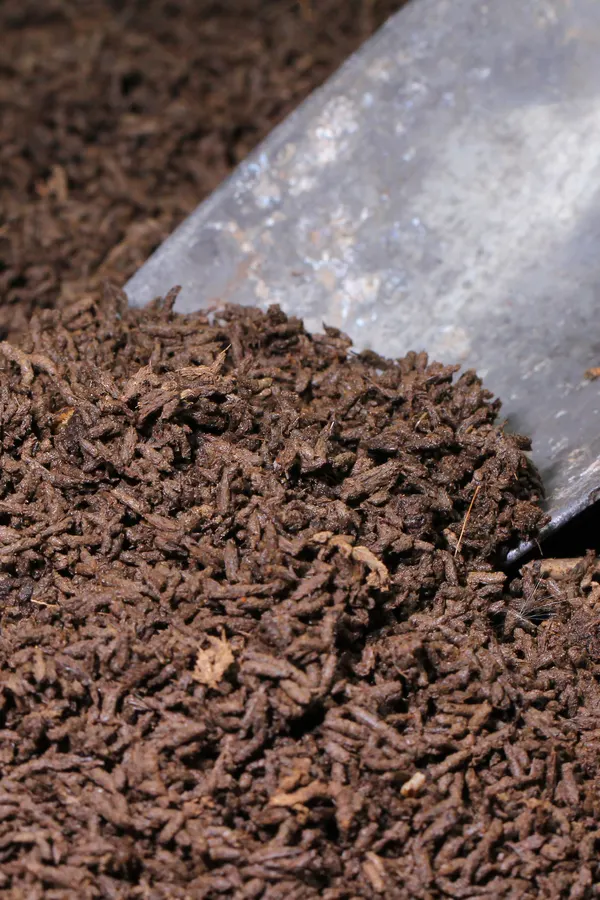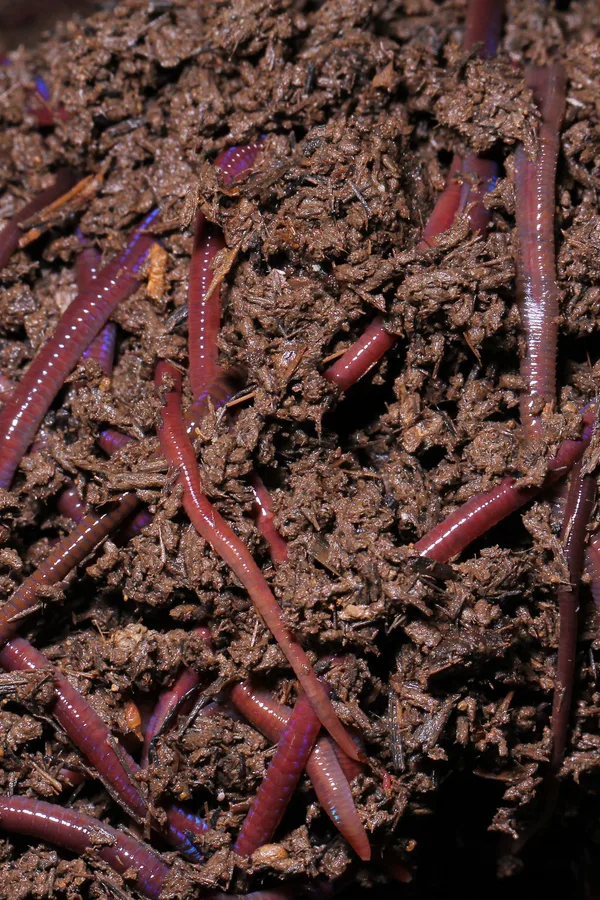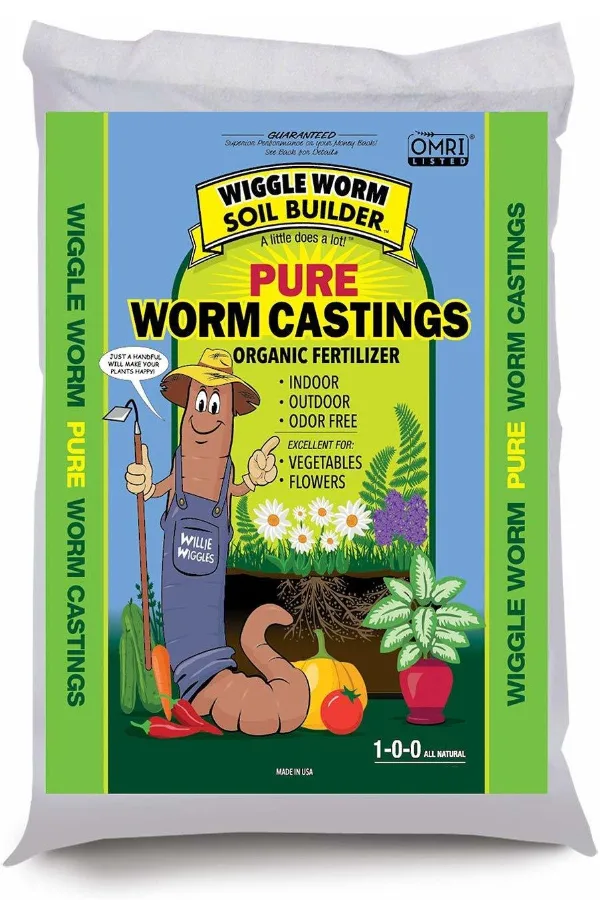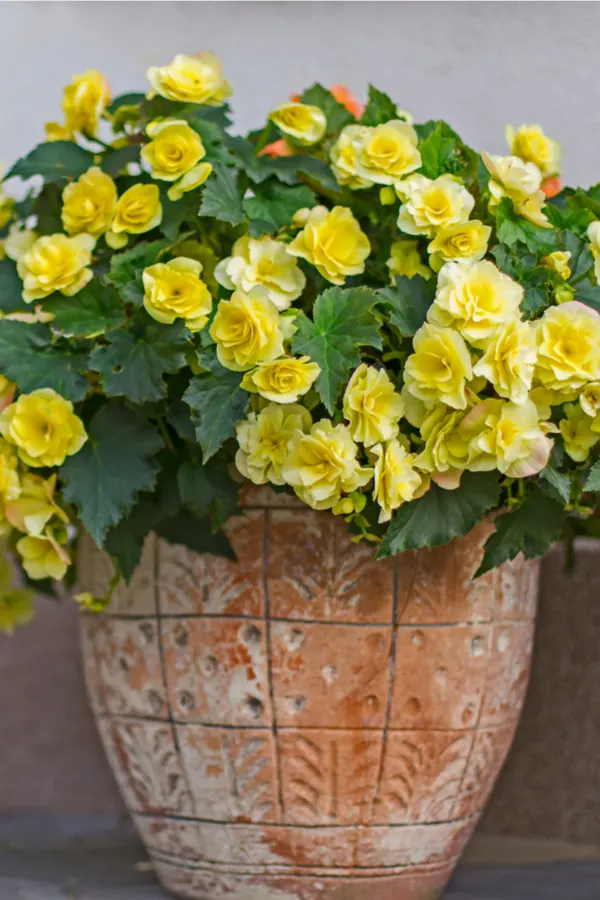When you use worm castings on annuals, vegetables, potted plants, hanging baskets and perennials – good things happen!
Worm castings have become a popular choice for home gardeners looking for an all natural solution to fertilizing. And with good reason, they work incredibly well!
Not only are they 100 percent organic, they also contain the perfect balance of nutrients to power plants. Even better, they also improve your soil while powering your plants.

Every time you mix worm castings into your soil, its overall structure improves. Worm castings help in keeping soil loose, all while improving drainage and holding moisture where it is needed most – right around the roots.
Here is a look at just exactly what worm castings are, and how you can use them to power the plants in your landscape with ease.
How To Use Worm Castings To Grow Better!
What Are Worm Castings?
Worm castings (vermicast) is a glamorous name for worm manure. As worms work through soil, they chew through all types of organic material.
As they do, the bits of organic material break down as they make their way through the digestive system of the worms. The end result is worm castings. And it is one of the most magical, rich and pure forms of manure that can be found!
Much like the manures of chicken, rabbit and other animals, worm castings are loaded with nutrients. Nutrients like calcium, nitrogen, magnesium, potassium and phosphorus.

As the castings break down, they release the minerals to recharge the soil and power plants. But all manures are not the same. And what makes worm castings more impressive than other manure choices is that they are much more stable and balanced.
Worm Castings vs. Animal Manure
Animal manure has long been used to recharge soil and power plants. And it certainly has many advantages when using it in gardens and flowerbeds. But you have to be careful. Especially when it is fresh!
If you were to put fresh chicken manure on a tomato plant, it would burn and kill the plant. Manure needs to be aged, diluted or composted before it can be used as a fertilizer. It is simply too “hot” with nutrients at the fresh stage.
But not the manure of worms. In fact, worm castings are not “hot” at all. And they can be used immediately, without any danger to the plants.
Check out our Podcast on Worm Castings!
Even better, they slowly release their nutrients over time, and not in one big dose. And when it comes to growing plants, low and slow is the absolute best way to go!
Although you can create homemade worm castings by having your own worms and worm bin, most opt to purchase their castings. But when selecting, always be sure to buy castings that are rated as 100% castings.
With the increase in popularity, many companies are now making castings with more filler than castings. Although it still provides some power, it can’t compare to the 100 percent castings. Product Link : 100% Worm Castings

How And Where To Use Worm Castings
Castings can be used in a myriad of ways throughout the landscape – both as a dry additive, or in a liquid form known as worm casting tea. Here is a quick breakdown of where and how to use both to help power your plants:
Vegetable Plants & Annual Flowers
When transplanting vegetable plants and flowers , set your plants up for power by adding a quarter cup of castings in every planting hole. Worm castings are the perfect slow-release fertilizer to get young transplants off to thriving start.

Hanging Baskets / Containers
You can use castings to power container plants and hanging baskets in several ways. When planting your own pots and containers, mix 1 cup of castings for every 4 cups of potting soil to make an incredibly rich growing soil.
For purchased plants, add a quarter to a half cup of castings to the top of the soil in the container or basket. Every time you water or it rains on the plants, the castings will leach their power into the roots. You can reapply the castings to the soil every month to plants to keep the power going.
Perennials
When planting perennials, mix a half cup of castings into the planting hole. Finish with another half cup on top of the soil to provide leaching nutrients for the plant as it adjusts into its new environment. This can help greatly with avoiding transplant shock for plants.
Seeds & Seedlings
To power seedlings when planting in the garden or flowerbeds, fill your planting hole or trench with a half inch of castings around the seed. It will help to hold moisture around the seeds and aids in faster sprouting. In addition, as the seedling grows, it can draw nutrients from the castings.
Starting Seeds Indoors
When starting seeds indoors, mix 1 cup of castings with 1 cup of potting or seed starting soil to fill your seed trays. The resulting soil mix will not only aid in germination, but in growing healthier transplants.
Worm Casting Tea
Soaking worm castings in water also creates an amazing liquid fertilizer. The liquid can then be applied to the foliage and soil around plants for a more “instant” power source.

Much like compost tea, worm casting tea is perfect for using on hanging basket and container plants to keep them blooming strong. It also can help young vegetable plants power up quickly too. In fact, it’s hard to find a plant that can’t benefit from a little worm casting tea!
To make, mix one-half to one cup of castings with 1 gallon of water. Let it soak for 24 hours, and then use to fertilize vegetable plants, hanging baskets, containers or flowerbeds. To use, simply water your plants as normal with the solution – leaves and all. The nutrients will absorb both through the leaves and roots.
Best of all, it works without danger of burning the plants at all. Here is to powering your plants up naturally!
Follow Our Facebook Page For Great Gardening Tips And Advice! This Is My Garden Facebook Page
This Is My Garden is a garden website created by gardeners, for gardeners. Jim and Mary Competti have been writing gardening, DIY and recipe articles and books and speaking for over 15 years from their 46 acre Ohio farm. They publish three articles every week, 52 weeks a year. Sign up today to follow via email, or follow along!
